What Are Spices and Why Are They Essential in Nigerian Cooking?
Spices are aromatic substances derived from plants, primarily used to enhance the flavour, colour, and aroma of food. They have been a cornerstone of cooking for centuries, with different cultures developing their own unique blends and techniques. In Nigerian cuisine, spices play a pivotal role in elevating the taste of dishes. They also help in transforming simple ingredients into bold, flavourful meals.
Furthermore, Nigerian spices bring depth and complexity to every dish. Not only do they help in creating memorable flavours, but they also offer numerous health benefits. This makes Nigerian spices an essential part of both daily meals and special occasions. In this post, we’ll explore some of the most important spices in Nigerian cooking. Additionally, we will also provide practical tips on how to use them in your kitchen.
List of Essential Nigerian Spices
-
Curry Powder
Curry powder is a staple in Nigerian kitchens, and one of the most commonly used spices in savory dishes. It is not a single spice but a blend of different spices, including turmeric, coriander, cumin, and fenugreek, among others. This blend imparts a rich yellow colour and a warm, aromatic flavour to the dishes it graces.
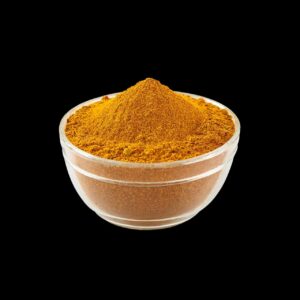
How to Use Curry Powder:
Curry powder is incredibly versatile. You can add it to fried rice, Jollof rice, or stews to give your dish a delightful warmth and depth. A teaspoon or two stirred into a pot of rice or stew is all it takes to bring out the rich, vibrant flavour. It’s especially popular in dishes like Nigerian fried rice, where it’s combined with vegetables, meats, and other seasonings to create a balanced and flavourful meal.
In addition to savory dishes, curry powder has also found its way into Nigerian pastries. Nowadays, some bakers add a bit of curry powder to their meat pies, chicken pies, and sausage rolls, giving these treats a unique twist. The subtle warmth and aromatic flavour enhance the savory fillings, making these pastries even more irresistible.
Additionally, curry powder can be used as a marinade for meats like chicken or beef, or even fish. This helps to add a savory kick to grilled or roasted dishes.
-
Thyme
Thyme is one of the most popular herbs used in Nigerian cooking. It has a strong, earthy flavour with a slight hint of mint and is used to season a variety of dishes, particularly meat and stews. Whether fresh or dried, thyme adds a layer of flavour that’s essential in many Nigerian meals.
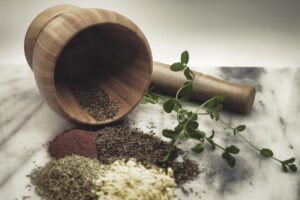
How to Use Thyme as an essential Nigerian spices:
Thyme is often used to season meats like chicken, beef, or fish, especially in dishes like jollof rice or stews. A few sprigs of fresh thyme or a teaspoon of dried thyme can go a long way in making your dishes more flavourful.
Besides jollof rice and stews, thyme can be sprinkled over roasted vegetables or added to fried rice for an extra burst of flavour. It pairs well with garlic, onions, and other seasonings, making it a go-to herb for many Nigerian dishes.
-
Nutmeg: Sweet and Aromatic Nigerian Spices for Desserts and More
Nutmeg is a sweet and aromatic spice that’s often used in Nigerian desserts and pastries. It has a warm, slightly spicy flavour that pairs perfectly with both sweet and savory dishes. In Nigerian cooking, nutmeg is particularly popular in pastries like chinchin, puff puff, and cake, where it adds a delicious depth to the flavour.

How to Use Nutmeg:
In Nigerian cooking, nutmeg is typically used in small amounts due to its strong flavour. It’s most commonly added to pastries like chinchin and puff puff to give them a warm, comforting taste. A pinch of nutmeg can transform a simple dough into something special.
Nutmeg is also used in savory dishes like stews, where it brings a subtle richness to the sauce. Additionally, it’s a great way to season meats like beef, chicken, or turkey. When used as part of a marinade or in stews, nutmeg helps to enhance the overall flavour profile, giving a slightly sweet yet savory kick.
In drinks, nutmeg can be added to Zobo (hibiscus drink) to give it a unique, warm flavour. This combination is especially popular during the festive season, adding a spicy twist to the tangy taste of Zobo.
Beyond pastries, meats, and drinks, nutmeg is often paired with cinnamon and cloves to create the comforting flavours of Nigerian holiday treats. This makes it a spice that truly brings warmth to any dish.
-
Uziza Seeds
Uziza seeds are a key ingredient in traditional Nigerian soups, particularly in the eastern and southern regions. These small, round seeds have a distinctive peppery, spicy flavour that adds an extra kick to any dish. Often found in dishes like nsala soup and oha soup, Uziza seeds are known for their unique aroma and taste.
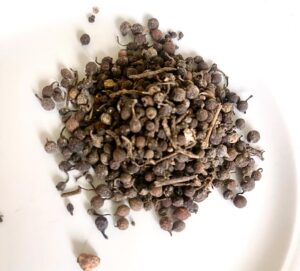
How to Use Uziza Seeds:
Uziza seeds are typically ground into a powder before being added to dishes. They can be used in both fresh and dried forms, but the ground form is most common in soups. To use, simply grind the seeds and add a teaspoon or so to your soup during cooking. It will infuse the dish with a spicy, peppery flavour. Thereby balancing out the richness of meats like goat, chicken, or fish.
In addition to soups, Uziza seeds can also be added to marinades for meat or fish. When used in the right amount, they bring a delightful, warming heat without overpowering the dish.
-
Ogiri: A Pungent Nigerian Spices with Rich Flavor
Ogiri is a fermented spice commonly used in Nigerian cooking, especially in soups and stews. Ogiri is made from fermented locust beans. It has a strong, pungent smell, but when used correctly, it brings a unique savory flavour to dishes. Ogiri is a key ingredient in many traditional Nigerian soups, including egusi and ogbono soup.
How to Use Ogiri:
Ogiri is typically used in its fermented form, either as a paste or in solid chunks. To use it, a small amount is enough to enhance the flavour of your dish. It’s often added at the beginning of cooking so that it can melt into the soup or stew. This helps to enrich the broth with its distinct flavour.
Ogiri works best when paired with other ingredients like pepper, garlic, and ginger. It’s particularly effective in seasoning meats like goat meat, fish, as the fermented aroma blends well with the richness of these proteins.
Although its smell may be off-putting to some. But its flavour is what makes it an essential part of many Nigerian dishes. Just a little bit goes a long way, making it a valuable spice in the kitchen.
-
Pepper
Pepper is one of the most essential and widely used spices in Nigerian cooking. From the fiery chilli pepper, scotch bonnet pepper to the milder types, pepper adds heat and a unique flavour to virtually every dish. It’s used fresh, dried, or in powdered form, and it’s a key ingredient in sauces, stews, soups, and even snacks.
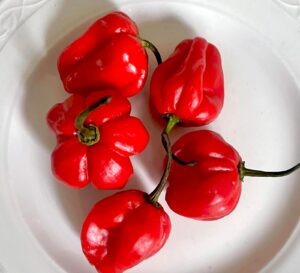
How to Use Pepper:
Pepper is incredibly versatile in Nigerian cuisine. Fresh peppers, particularly scotch bonnet or habanero peppers are often blended into the base of many dishes to create a spicy and flavourful foundation. You can add it to stews like tomato stew or to soups like pepper soup for a bold, hot kick or any type of soup.
In addition to fresh peppers, dried pepper and pepper powder are frequently used as seasonings. You can sprinkle ground pepper on dishes like Jollof rice, fried rice, or even grilled meats to give them a spicy lift. It also works well in marinades for meats, helping to tenderize and infuse them with heat.
If you’re sensitive to heat, you can adjust the amount of pepper you use to your taste. For those who enjoy spicier dishes, scotch bonnet peppers can be used liberally to bring that signature heat that defines Nigerian cuisine.
-
Scent Leaves
Scent leaves, also known as Efirin in Yoruba or Nchuanwu in Igbo, are aromatic leaves that play an essential role in Nigerian cooking. With their fragrant aroma and slightly bitter taste, scent leaves are often added to soups, stews, and pepper soup to infuse dishes with a fresh, herbal flavour.
How to Use Scent Leaves:
Scent leaves are typically used fresh and are added to dishes at the end of the cooking process to preserve their flavour and aroma. They are commonly used in Nigerian soups such as pepper soup, native jollof rice (oil rice)and afang soup, where they contribute a fragrant, earthy taste that balances out the richness of the meat or fish.
To use scent leaves, simply wash them thoroughly, remove the stems, and chop them finely before adding them to your dish. A handful of scent leaves will go a long way in brightening up the flavour of your meal.
In addition to soups and stews, scent leaves can also be used to season grilled meats, adding a unique herbal flavour that complements the smoky taste.
-
Ginger
Ginger is a fragrant, spicy root that adds warmth and zest to many Nigerian dishes. It is one of the most popular spices used in both savory and sweet recipes. Known for its distinct sharp, peppery flavour, ginger is a common ingredient in Nigerian soups, stews, and drinks.
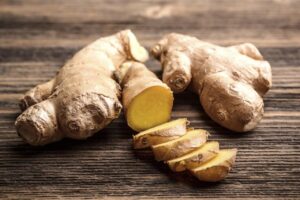
How to Use Ginger:
Ginger is used both fresh and dried in Nigerian cooking. Fresh ginger is often grated or chopped into small pieces and added to stews, soups, or sauces to infuse them with its unique flavour. It’s commonly used in dishes like pepper soup, jollof rice, fried rice, and stew, where it blends seamlessly with other spices to create a complex, aromatic base.
Ginger also pairs well with meats, poultry, and fish. It can be used to season meats before grilling or frying, adding a subtle heat that enhances the taste. In addition, ginger is used in Nigerian drinks like Zobo and Fanta/ginger drink, where it gives a spicy kick to the refreshing beverages.
The dried, powdered form of ginger is often sprinkled into pastries and desserts like cakes and chinchin, contributing a warm, comforting flavour that’s especially popular during the holiday season.
-
Onions
Onions are a staple in almost every Nigerian kitchen. Known for their savory and slightly sweet flavour, onions are used in a wide range of dishes. Whether fresh, fried, or sautéed, onions form the base of many Nigerian soups, stews, and sauces, providing depth and richness to the overall flavour profile.
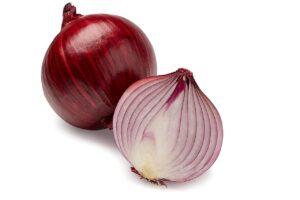
How to Use Onions as an Essential Nigerian Spices:
In Nigerian cooking, onions are often used as a foundation ingredient in stews and soups. They are typically chopped, blended, or sliced, then sautéed in oil to release their sweetness before adding other ingredients like tomatoes, pepper, and seasonings. This helps to create a flavourful base for many dishes like jollof rice, pepper soup, and beef stew.
Onions are also used in marinating meats to tenderize them and enhance their flavour. They can be sprinkled over grilled fish or meats for added crunch and freshness, or blended into smoothies and drinks for a unique, sharp flavour.
In addition to fresh onions, dried onions or onion powder are commonly used in spice blends and seasonings, making them a convenient option for quick meals.
-
Garlic
Garlic is another essential spice in Nigerian cooking, known for its pungent aroma and bold flavour. It’s used in a variety of dishes, from stews and soups to marinades and sauces. Garlic adds a rich, savory element to meals, making it one of the most versatile ingredients in the kitchen.
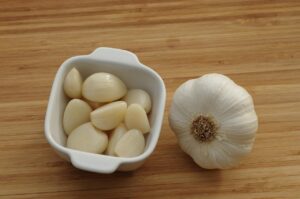
How to Use Garlic:
Garlic is commonly used fresh, though powdered garlic is also popular in many spice mixes. To use fresh garlic, simply peel and chop or crush the cloves to release their flavour before adding them to your dish. Garlic is often sautéed in oil at the beginning of cooking, alongside onions, to create a flavourful base for soups, stews, and sauces.
In Nigerian dishes like jollof rice, and stews, garlic helps to enhance the savory taste of the dish and adds a layer of depth. Garlic can also be used in marinades for meat and fish, where it helps tenderize and infuse the protein with flavour.
In addition to savory dishes, garlic is also used in beverages like Zobo and in sauces for snacks like suya and shawarma. Its bold flavour gives these dishes a signature kick that makes them irresistible.
-
Locust Beans (Iru)
Locust beans, commonly called Iru in Yoruba, OgiriOkpei in Igbo, or Dawadawa in Hausa, are a traditional Nigerian spice made from fermented seeds of the African locust bean tree. Locust beans are known for their pungent aroma and rich umami flavour. This spice are a staple in Nigerian cooking and are highly valued for their nutritional benefits.
How to Use Locust Beans:
Iru is often added to soups and stews to enrich their flavour. It is a key ingredient in popular Nigerian dishes like Egusi soup, Ewedu soup, Ogbono soup, and Ofada sauce. To use locust beans, rinse them lightly to remove any impurities, then add them to your dish during cooking to allow their flavour to meld with the other ingredients.
You can use locust beans whole or grind them into a paste, depending on your preference. They are best added toward the middle or end of the cooking process to retain their unique taste and nutrients. Locust beans pair especially well with leafy vegetables and enhance the depth of flavour in traditional Nigerian soups.
In addition to their culinary uses, locust beans are also rich in protein, vitamins, and minerals, making them a nutritious addition to your meals.
Conclusion
Nigerian spices are the backbone of the vibrant and flavourful cuisine that defines the country’s culinary traditions. Whether you’re preparing a hearty soup, a spicy stew, or a sweet treat, the combination of spices like nutmeg, Uziza seeds, ginger, and garlic adds a unique and unforgettable taste to each dish.
From savory stews to sweet pastries, these spices bring a depth of flavour that truly captures the essence of Nigerian cooking. By experimenting with these essential spices, you can elevate your dishes and explore the rich, aromatic flavours that make Nigerian food so special. So, don’t hesitate to add these spices to your kitchen – they’ll transform your cooking and bring a taste of Nigeria right to your table.
FAQs
-
Can I use powdered Nigerian spices instead of fresh ones?
Yes, you can substitute powdered versions of spices like ginger, garlic, and nutmeg for their fresh counterparts. However, fresh spices tend to provide a stronger, more vibrant flavour. Powdered spices are convenient and often more concentrated, so use them in smaller amounts.
-
Are all Nigerian spices available in regular grocery stores?
Some Nigerian spices, like garlic, ginger, and onions, are widely available. While others, like Uziza seeds, Ogiri, and scent leaves, may be more difficult to find in non-specialty stores. You can try African or international grocery stores or purchase them online.
-
How do I store fresh Nigerian spices like scent leaves and ginger?
Fresh scent leaves should be stored in the fridge and used within a few days to maintain their flavour. Fresh ginger can be kept in the refrigerator or freezer; freezing it extends its shelf life. You can also dry scent leaves for longer storage, though their flavour may change slightly.
-
Can I mix Nigerian spices with other cuisines?
Absolutely! Nigerian spices blend well with other cuisines, especially in fusion cooking. For example, adding a bit of ginger, garlic, and nutmeg to a stir-fry or baked goods can create a unique, flavourful twist. Just be mindful of the spice levels to avoid overpowering the dish.
-
Are Nigerian spices good for health?
Many Nigerian spices have health benefits. For example, ginger is known for its anti-inflammatory properties, garlic has immune-boosting effects, and pepper can help with digestion. Like any spices, they should be consumed in moderation as part of a balanced diet.

